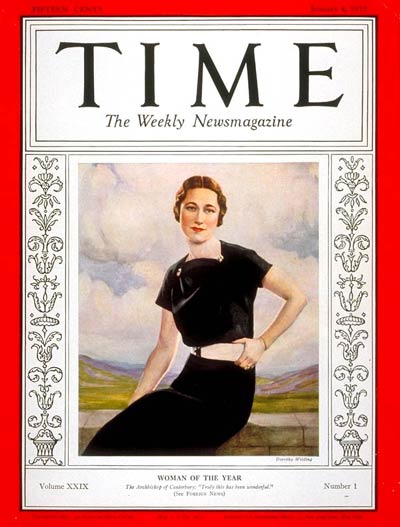When Britain’s Prince Harry and actor Meghan Markle announced their engagement on Monday, after dating for a little over a year, the couple broke the royal mold in many ways.
Markle’s background — she is American and has been married before, for example — will make her stand out among royal brides of the past, though she won’t be the first royal bride to whom those descriptors would apply. But, while the world has largely greeted the news of Prince Harry’s engagement with glee, when a British royal and a previously married American fell in love eight decades ago, the reaction was very different.
In fact, when King Edward VIII fell for Wallis Simpson, whom he met at a London nightclub, his love for her ended up costing him the throne. Prime Minister Stanley Baldwin told the King that he had to choose between being King and being Simpson’s husband, as the Church of England did not recognize marriages to divorcées and, as the British monarch, Edward was also the head of the Church of England. Those rules have since changed. In July 2002, the church loosened its restrictions, acknowledging that “some marriages regrettably do fail” and that “there are exceptional circumstances” and that “the decision as to whether or not to solemnize such a marriage in church after divorce rests with the minister.” (The marriage of Prince Charles and the Duchess of Cornwall is the second for them both, and the stakes would be far lower for Prince Harry anyway: He’ll be sixth in line for the throne after the birth of his older brother’s third child.)
In 1936, King Edward chose Mrs. Simpson, and became Prince Edward, Duke of Windsor. His brother became King George VI.
“You must believe me when I tell you that I have found it impossible to carry the heavy burden of responsibility and to discharge my duties as King, as I would wish to do, without the help and support of the woman I love,” he said in a radio address on Dec. 11, 1936, informing his people that he would be stepping down.
“Prince Edward did not defend either himself or Mrs. Simpson. That would have been undignified. The skeleton must not be jangled,” TIME wrote in its coverage of the historic broadcast in Dec. 21, 1936, issue.
Despite the uncomfortable exit, after she became duchess of Windsor when they wed on June 3, 1937, in France at a château near Tours, their quality of life appeared to be quite comfortable, as TIME noted in Simpson’s 1986 obituary. “Ostracized by the royal family but reportedly provided with a £2 million settlement and a yearly income of £60,000, she and the new duke began cultivating the fine art of doing nothing during years of elegant exile,” as TIME put it.
And yet, as time went on, the controversy would remain a cautionary tale of sorts. For example, when the engagement of Prince Harry’s parents, the Prince of Wales Charles and Lady Diana Spencer, was announced in 1981, TIME noted that “Diana’s pristine past is also a matter of importance to the royal family in view of the romantic history of the last Prince of Wales, who abdicated his throne in 1936 to wed Wallis Simpson, a woman who had previously been married and divorced.” That moment in history is also one reason why British tabloid coverage was so aggressive in the Diana era. As one photographer for The Sun told TIME, “never again” would the British press allow a repeat of 1936, when American papers beat Fleet Street to breaking news about the couple because the British press kept a respectful silence on the issue.

The scandalous nature of that 1930s marriage also came to represent a changing tide in the world of the royals, and beyond. It was a shift that was already apparent when TIME made Wallis Simpson “Woman of the Year” for 1936, the first time the title of Person of the Year — then formally known as “Man of the Year” — went to a woman.
“In the entire history of Great Britain there has been only one voluntary royal abdication and it came about in 1936 solely because of one woman, Mrs. Simpson,” the magazine said, in explaining the choice. “In the single year 1936 she became the most-talked-about, written-about, headlined and interest-compelling person in the world. In these respects no woman in history has ever equaled Mrs. Simpson, for no press or radio existed to spread the world news they made. In England the news that the King, as King, wanted to marry Mrs. Simpson was the final culmination of a tide of events sweeping the United Kingdom out of its cozy past and into a more or less hectic and ‘American’ future.”
More Must-Reads From TIME
- The 100 Most Influential People of 2024
- Coco Gauff Is Playing for Herself Now
- Scenes From Pro-Palestinian Encampments Across U.S. Universities
- 6 Compliments That Land Every Time
- If You're Dating Right Now , You're Brave: Column
- The AI That Could Heal a Divided Internet
- Fallout Is a Brilliant Model for the Future of Video Game Adaptations
- Want Weekly Recs on What to Watch, Read, and More? Sign Up for Worth Your Time
Write to Olivia B. Waxman at olivia.waxman@time.com